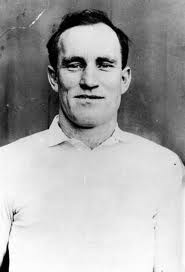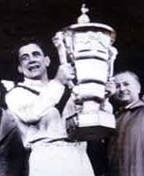Top International RL Matches
In chronological order with no consideration of merit
1st January 1908 Wales 9 New Zealand
14th July 1914 Australia Northern Union 14 Sydney
Australia 3rd July 1920 Australia Northern Union 8 Sydney
Australia Brisbane Sydney with tries from Farnsworth, Gilbert, Horder, Potter and Vest with goals from Burge and Horder and a drop goal from Fraser. The Lions replied with tries from Gallagher and Johnson and a goal from Gronow
15 April 1934 France England
Australia
After the devestation casued by World War II, Great Britain relaunched International Rugby League with a tour down under which was the first major event in any sport after the war. Captained by Gus Risman, they are regarded as the greatest touring team of all time and they still remain the only Great Britain team to remain unbeaten in a test series in Australia. At the time, the only way to travel was onboard Royal Navy vessels and the team made the trip onboard HMS Indomitable from which their nickname came. The first test was drawn 8-8 in Sydney while Great Britain won the second test 14-5 in Brisbane. The Ashes were retained with a 20-7 win at the Sydney Cricket Ground with tries from Bassett, Curren and Owens with goals from Risman(3) and Ward
France Australasia 1951
CLICK HERE to view some excellent footage of the 1951 French Tourists in action
First World Cup Final
The Kumuls fromPapua New Guinea
Papua New Guinea France Europe in 1979
The First International RL match
In 1907-08, Albert Henry Baskerville organized a group of New Zealand UK Northern Union opposition. Dubbed the All Golds they included Australian susperstar Dally Messenger as a guest and played a total of 46 matches including the first RL international against Wales
Dally Messenger Albert Baskerville
Rorke’s Drift Test
The 1914 GB Lions tour to Australia Australia
The Northern Union received some consolation by winning the third test 23-13 in Sydney




Australia v England 1933 Jean Galia
First International Match for France
After an exhibition match between AustraliaFrance England Hull England England
The Indomitables
20th July 1946 After the devestation casued by World War II, Great Britain relaunched International Rugby League with a tour down under which was the first major event in any sport after the war. Captained by Gus Risman, they are regarded as the greatest touring team of all time and they still remain the only Great Britain team to remain unbeaten in a test series in Australia. At the time, the only way to travel was onboard Royal Navy vessels and the team made the trip onboard HMS Indomitable from which their nickname came. The first test was drawn 8-8 in Sydney while Great Britain won the second test 14-5 in Brisbane. The Ashes were retained with a 20-7 win at the Sydney Cricket Ground with tries from Bassett, Curren and Owens with goals from Risman(3) and Ward
11th June 1951 Australia
In 1951, France toured of Australasia for the first time led by their legendary fullback Puig Aubert. Their flamboyant style of rugby attracted large crowds and the first Test match was the first "all ticket" international to be staged at the Sydney Cricket Ground with a crowd of over 60,000. They lost just five times on the twenty eight game tour, including a 2-1 victory in the test series, and were greeted by large crowds on their return to FranceCLICK HERE to view some excellent footage of the 1951 French Tourists in action
13 November 1954 France 12 Great Britain 16 Parc de Princes, Paris
The First Rugby League World Cup was organized by the French RL under Paul Barriere and took place in France France BBC broadcast the match live in the UK which was a novelty for the time
French Team return home in 1951 Dave Valentine
Everybody's saying go go go and he goes
2nd November 1972 Great Britain
The 1972 World Cup was played in France Great Britain Australia Great Britain Australia Great Britain
The Kumuls from
6th July 1975 Papua New Guinea
The Invincibles
30th October 1982 Great Britain 4 Australia 40 Hull
Australia's side for the first Test was built around the new breed of young players Grothe, Pearce, Meninga, Kenny and Sterling. Great Britain included five players aged over the age of thirty and they were competitive in the first half although Australia led 10-4 at half time. In the second half, the Kangaroos demonstrated their superlative skills including pace, guile, teamwork and fitness and scored six stunning tries in the process. The Great Britain team, the crowd and the game in the UK were stunned and have not really recovered to this day.
30th October 1982 Great Britain 4 Australia 40 Hull
Australia's side for the first Test was built around the new breed of young players Grothe, Pearce, Meninga, Kenny and Sterling. Great Britain included five players aged over the age of thirty and they were competitive in the first half although Australia led 10-4 at half time. In the second half, the Kangaroos demonstrated their superlative skills including pace, guile, teamwork and fitness and scored six stunning tries in the process. The Great Britain team, the crowd and the game in the UK were stunned and have not really recovered to this day.








Comments
Post a Comment